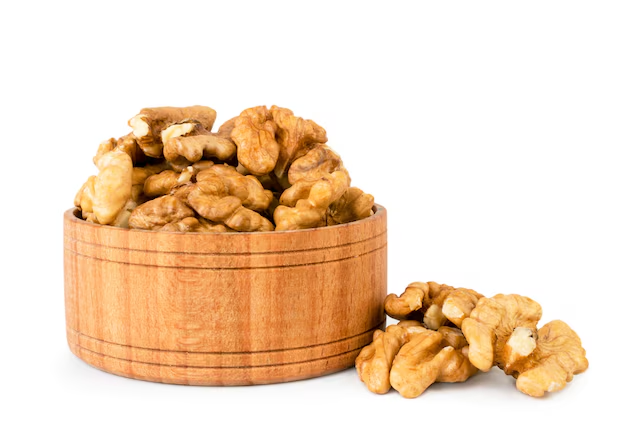Walnuts are a favorite among nuts, cherished for their unique taste and texture. But beyond their appeal in culinary dishes, a common question arises: Are walnuts healthy? The answer is a resounding yes. Known for their impressive nutritional profile and numerous health benefits, walnuts have cemented their reputation as a superfood. This article delves into the science-backed benefits of walnuts, their nutritional composition, and how they compare to other popular nuts.
Nutritional Profile of Walnuts
Walnuts boast a robust nutritional composition that makes them a standout in the world of nuts. From macronutrients to essential micronutrients, these nuts pack a healthful punch.
Macronutrient Composition
Walnuts are rich in healthy fats, moderate in protein, and low in carbohydrates.
- Fats: Walnuts contain mostly unsaturated fats, which support heart health. These include polyunsaturated and monounsaturated fats.
- Protein: Offering about 4 grams of protein per ounce, walnuts provide plant-based protein essential for muscle repair and growth.
- Carbohydrates: Low in carbs, with about 4 grams per ounce, they’re a great option for low-carb diets.
Rich Source of Omega-3 Fatty Acids
One of the most notable attributes of walnuts is their high content of alpha-linolenic acid (ALA), a plant-based omega-3 fatty acid.
- ALA is crucial for heart health, reducing inflammation, and maintaining cellular integrity.
- Studies by Harvard Health highlight ALA’s role in reducing the risk of cardiovascular diseases and improving lipid profiles.
Vitamins and Minerals
Walnuts are a treasure trove of essential nutrients.
- Vitamin E: Acts as a powerful antioxidant, protecting cells from damage.
- Magnesium: Vital for bone health, energy production, and nerve function.
- Antioxidants: Walnuts contain polyphenolic compounds, which combat oxidative stress.
Health Benefits of Walnuts
Walnuts offer an array of health benefits, making them a valuable addition to any diet.

Cardiovascular Health
Regular consumption of walnuts has been linked to improved heart health.
- They help lower LDL cholesterol (the “bad” cholesterol) while raising HDL levels.
- The presence of omega-3s, polyphenols, and magnesium collectively supports vascular health and reduces arterial inflammation.
Brain Health and Cognitive Function
Walnuts are often referred to as “brain food” due to their resemblance to the human brain and their cognitive benefits.
- They are rich in antioxidants and omega-3s, which support brain cell integrity.
- According to research cited in the New York Post, walnuts may reduce the risk of neurodegenerative diseases like Alzheimer’s.
- They also enhance memory, focus, and learning capacity.
Anti-Inflammatory Properties
Inflammation is at the root of many chronic diseases, from arthritis to heart disease.
- Walnuts’ polyunsaturated fats and antioxidants help combat inflammation at the cellular level.
- The presence of ellagic acid and flavonoids enhances their anti-inflammatory action.
Weight Management
Despite being calorie-dense, walnuts can aid in weight management.
- They are highly satiating, helping you feel full longer.
- Walnuts are an excellent snack for curbing cravings without resorting to unhealthy foods.
Studies reveal that adding walnuts to a balanced diet can support weight loss or maintenance goals.
Blood Sugar Control
Walnuts may also benefit individuals with type 2 diabetes or those at risk of developing it.
- Their low glycemic index and healthy fat content help stabilize blood sugar levels.
- Research from EatingWell indicates that regular walnut intake can improve insulin sensitivity.
Comparing Walnuts to Other Nuts
While walnuts are incredibly nutritious, how do they stack up against other popular nuts? Let’s dive into a comparative analysis.
Walnuts vs. Almonds
- Nutritional Differences: Almonds are slightly higher in protein and vitamin E, while walnuts dominate in omega-3 content.
- Health Benefits: Almonds are excellent for bone health and skin due to their calcium and vitamin E content. However, walnuts’ omega-3s give them an edge in supporting cardiovascular and brain health.
Walnuts vs. Cashews
- Nutritional Differences: Cashews are richer in magnesium and iron but lack the omega-3s present in walnuts.
- Health Impacts: Cashews are great for energy production and bone health. However, walnuts’ anti-inflammatory and heart-health benefits make them a more versatile choice for overall wellness.
How to Incorporate Walnuts into Your Diet
Making walnuts a staple in your diet is easier than you might think. From recommended serving sizes to creative culinary uses, here’s how to enjoy them effectively.

Daily Recommended Intake
To reap the health benefits of walnuts without overdoing it, moderation is key.
- Recommended Serving Size: A handful of walnuts, about 1 ounce (28 grams) or 7 whole walnuts, is sufficient.
- Frequency: Daily consumption is ideal for cardiovascular, brain, and overall health benefits.
- Caloric Awareness: While nutritious, walnuts are calorie-dense. Stick to the recommended serving size to avoid exceeding your daily caloric needs.
Integrating this small portion into your diet provides a wealth of omega-3 fatty acids, antioxidants, and essential nutrients.
Creative Recipe Ideas
Walnuts are incredibly versatile and pair well with a variety of dishes. Here are some creative ways to include them in your meals:
- Salads: Sprinkle chopped walnuts over green salads for a satisfying crunch and a boost of nutrients.
- Oatmeal and Yogurt: Mix walnuts into oatmeal or yogurt for a hearty breakfast or snack.
- Baked Goods: Incorporate walnuts into muffins, bread, and cookies for added texture and flavor.
- Smoothies: Blend walnuts into smoothies to add creaminess and a dose of healthy fats.
- Savory Dishes: Use ground walnuts in sauces, pestos, or as a crust for baked fish or chicken.
Experimenting with recipes not only enhances flavor but also maximizes your intake of essential nutrients.
Considerations for Walnut Allergies
Walnut allergies are relatively common and can cause reactions ranging from mild to severe.
- Symptoms: Itching, swelling, difficulty breathing, or gastrointestinal discomfort after consuming walnuts may indicate an allergy.
- Precautions:
- If you suspect an allergy, consult with a healthcare provider for testing.
- Avoid cross-contamination by keeping walnuts separate from other foods if someone in your household is allergic.
- Alternatives: If allergic, consider seeds like sunflower or chia as substitutes, which offer similar nutrients.
Being aware of these considerations ensures safe consumption for everyone in your family.
Related to Read: Toasted Walnut Tuna Salad
Potential Risks and Considerations
While walnuts are a nutritional powerhouse, certain factors warrant caution. It’s essential to balance their benefits with mindful consumption.
Caloric Density
Walnuts are rich in calories, with about 185 calories per ounce.
- Moderation is Crucial: Overeating walnuts may lead to unintentional weight gain.
- Smart Snacking: Pair walnuts with low-calorie foods like fresh fruits or vegetables to maintain balance.
Understanding their caloric content helps you enjoy walnuts without negatively impacting your weight management goals.
Interaction with Medications
Walnuts may interact with certain medications, so it’s wise to consult a healthcare provider if you’re on regular medication.
- Blood Thinners: The omega-3 fatty acids in walnuts can have a blood-thinning effect, which might interfere with medications like warfarin.
- Diabetes Medications: Walnuts may influence blood sugar levels, so monitoring is essential if you’re on insulin or other diabetes treatments.
- Digestive Sensitivities: Some people may experience bloating or gas when consuming large amounts of nuts.
If you have specific health concerns or are taking medications, speak with a healthcare professional to ensure safe consumption.
Related to Read: Basil Walnut Pesto Recipe
Frequently Asked Questions About Walnuts
Are walnuts beneficial for heart health?
Yes, walnuts are excellent for heart health. Their omega-3 fatty acids, antioxidants, and magnesium help reduce LDL cholesterol, improve arterial function, and lower inflammation.
Can walnuts improve brain function?
Walnuts are often referred to as “brain food.” They contain antioxidants and omega-3s, which support brain health, improve memory, and may reduce the risk of cognitive decline.
How many walnuts should I eat per day?
Eating about 1 ounce (7 whole walnuts) daily is ideal for gaining health benefits without excessive calorie intake.
Are there any side effects of eating walnuts?
While walnuts are generally safe, overconsumption can lead to weight gain due to their high caloric density. Allergies or mild digestive discomfort may also occur in some individuals.
Conclusion
Walnuts are a fantastic addition to any diet, providing a rich source of nutrients and health benefits ranging from improved heart and brain health to anti-inflammatory properties. Incorporating walnuts creatively into meals ensures you enjoy their benefits without monotony. However, be mindful of their caloric density and potential interactions with medications. By consuming them in moderation, walnuts can be a delicious and healthful part of a balanced diet.

